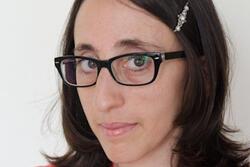The Sandwich Generation: An Interview with Author Iris Waichler
Recently, the Pew Research Center has found that in 2013, 47% of adults, ages 40-59, had both a parent who was sixty-five or older and children they were still financially supporting. This group, called the “Sandwich Generation,” will only grow larger as people live longer and have children later. The responsibility of taking care of elderly parents often falls on daughters who are also mothers and professionals. JWA spoke to author, social worker, and patient advocate Iris Waichler about her new book, out August 16th, Role Reversal: How to Take Care of Yourself and Your Aging Parent, and the different ways you can support your parents, your family, and yourself.
Q: What prompted this book in this particular moment?
A: I began writing this book four years ago. Originally, it was going to be a memoir about my father. He was a wonderful man who had been a caregiver all of his life. As I began discussing the book, everyone I spoke with had a story about taking care of their parents. I wanted to offer readers current content that addressed the most challenging aspects of caregiving for a parent, while also sharing my own experience as the caregiving daughter of an aging parent. I decided to blend my personal experience and my forty years of professional expertise as a medical social worker/patient advocate.
Q: With more and more people anticipating taking care of elderly parents, what advice would you give on how they can best plan ahead and communicate with their parents about the future?
A: That is a great question. I talk a lot about being proactive. I recommend sitting down and having a candid discussion when the parents are healthy and thinking clearly. Ask your parents what type of help they envision needing as they age and begin to develop problems with mobility or memory. Do they plan on staying in their home or would they consider moving somewhere else? How would they feel about a family member helping with their care? Which family member do they envision doing it? Is that person okay with the role? Another huge issue is estate planning.
Make sure health directives are in place. This means signed legal documents outlining what the parent’s wishes are if they cannot decide their own medical care. Discuss whether they want a do-not-resuscitate order. It is a huge gift to you, as the caregiver, if you know this information. In a crisis you want to understand their insurance coverage, finances, and where this information is located.
Q: In your professional and personal experience, what are the common ways that aging parents react to this shift in their parent-child relationship? How can a child help preserve their parent’s dignity while also ensuring they get the care they need?
A: A lot depends on the previous relationships that were established before this ultimate role reversal happens. If the previous relationship is positive, it tends to go more smoothly because there is mutual respect, love, and trust. If the previous parent-child relationship was abusive or negative in some way, that can impact this shift in roles and makes it more difficult and complicated. Dignity is a huge issue when you are helping your parent with very intimate tasks like bathing, going to the bathroom, and dressing. I advise adult children to openly talk with their parent about what might feel mutually uncomfortable. If possible, get a non-family member to help with these tasks.
Q: When it comes to taking care of elderly parents, what advice do you have?
A: First, I would say, remember you bring your past relationships with your family into your role as caregiver. If there were previously unresolved conflicts, they may rise up when your roles are reversed. Consider that before you take on this role, and ask yourself, are you the best person for the job? Secondly, as much as possible, mutual respect, and dignity, need to be in place for both your parent and you, as the caregiver. This is one of the toughest aspects of the role reversal. Seeing your parent be this vulnerable is painful for all concerned. Thirdly, caregiving responsibilities can tear families apart…My book has a chapter on building a support network. It is critical for siblings to sit down with their parents and identify what help is needed, how often they will need assistance, and who has the skills to offer that help. Even if a sibling is geographically distant, that person may be able to help with managing insurance or hospital bills. Set up a plan and set up a date, (no more than three months later), where you can get together and evaluate how it is working and what additional support needs to be put in place.
Q: Jewish poet,Lesléa Newman once wrote, “a daughter’s a daughter for all of her life.” Do you think the expectations people have about daughters and family affect decisions around caretaking and who should take responsibility?
A: Yes, I do. The National Alliance for Caregiving reports the average caregiver is a forty-nine-year-old woman who is working full time and married with children. The Family Caregiver Alliance says 75% of all caregivers are women. I do believe family expectations influence decisions about care taking. Most of the time, the daughter volunteers. That, in combination with family relationships and culture, helps determine who will be responsible and how caregiving tasks and roles are decided.
Q: What was it like for you to have both a child at home and a father who needed more care and attention? Was it difficult being both a mother and a daughter at once? How did you juggle and/or prioritize those roles?
A: It was a challenge. I am incredibly lucky to have a supportive husband who helped with both my dad and my daughter. I also don’t have the demands of a full time job. Juggle is a good word. My dad was the priority during the health crisis and the final days of his life. I always tried to make time to spend with my daughter as much as I could but I did feel guilty I could not be with my daughter in the way that I wanted. Balancing your role as both a daughter and a parent is one of the toughest challenges related to caregiving.
Q: How do you think Jewish ideas of family and history affect the way that Jewish children take care of their elderly parents?
A: I think there is obviously a strong sense of family commitment and sacrifice in Jewish tradition. It certainly is in my family. When I was growing up, we had my three grandparents live with us and my parents took care of them until they died. There is not a question of, “Will I take this on?” but more, “What can I do to make this caregiving role work?”
Q: What are the key ways that people can maintain self-care while taking care of a parent?
A: I just wrote an article about this that will be out soon! The top four tips that I gave were:
- Allow yourself to feel the loss of the parent you knew. Ignoring feelings can cause burnout, anger, and more stress.
- Ask for help when you need it. Most people who are caregivers wait too long, and it takes such an emotional and physical toll that you lose yourself and other areas of your life that are meaningful and nourishing.
- Identify someone you trust and can talk candidly with as you maintain your caregiver role. If you don’t have that person, find a healthcare professional who specializes in grief and loss.
- Finally, you must make time to be with people and do things that you enjoy, things that nourish and energize you. Do it without feeling guilty!
Iris Waichler, MSW, LCSW has been a licensed clinical social worker and patient advocate for 40 years. Her new book, Role Reversal: How to Take Care of Yourself and Your Aging Parents, will be released August 16, 2016. Her previous book, Riding the Infertility Roller Coaster: A Guide to Educate and Inspire, won 4 major book awards. She has authored hundreds of articles on healthcare and patient advocacy topics. You can learn more about Ms. Waichler at her website: http://iriswaichler.com/









Hello!
I just discovered your wonderful website! Are you an author that makes library visits?
We would be so happy to have you here!!
Please let me know...Thanks!
Maryellen